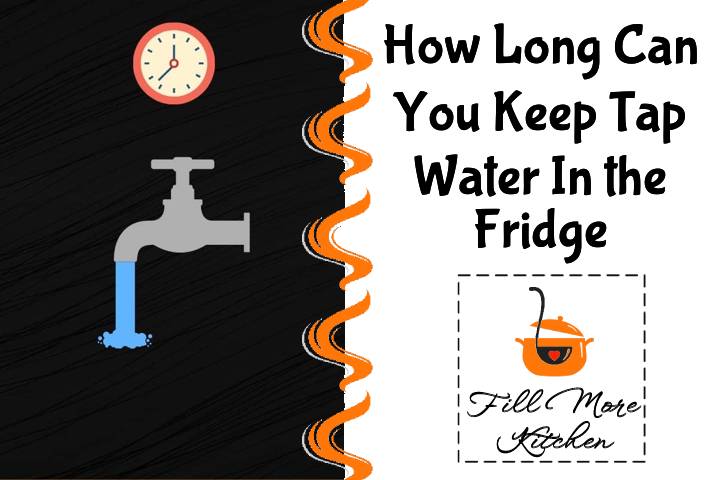With the current hot weather in many parts of the northern and western hemispheres, you may be thinking about refrigerating a jug of water to have on hand when seeking relief from the heat.
It is possible to store tap water in the refrigerator for a maximum of six months, but it is advisable to use a glass container to avoid the possibility of harmful toxins contaminating the water. If you exceed this time frame, there is a risk of dangerous toxins or bacteria growing in your water.
It is important to replace your water frequently to avoid this from happening.
This article provides information on how to prepare water for long-term storage in case of a potential natural disaster, including the best container for storing your water for emergencies.
Does Tap Water Go Bad?
Tap water doesn’t expire, however, it is susceptible to contamination. If tap water is stored correctly in the refrigerator, it can last for a maximum of six months.
Tap water can last up to 6 months if stored in a safe place and protected from environmental factors that may cause contamination or bacterial growth.
If you intend to refrigerate your tap water, it is advisable to boil it beforehand. This process will eliminate a majority of the bacteria and germs, thereby preventing the water from turning toxic. Nevertheless, even if you skip boiling the water, as long as you keep it in the fridge, it is improbable that it will spoil.
Sanitize the container before use to avoid the growth of mold, bacteria, and other harmful contaminants in your tap water.
Ideally, for longer-term storage, it is recommended to use a metal or glass container instead of a plastic container due to the toxins present in plastic that can seep into the water.
To avoid any potential contaminants from accumulating in the water, it is important to use a sanitized container. For best quality, it is recommended to keep tap water in the fridge unless it has been treated for long-term storage.
How Do You Know If Water Has Gone Bad?
If tap water smells musty, appears cloudy, or has debris present, it may have gone bad due to the presence of bacteria or microorganisms. Additionally, the mustiness could be an indication of contaminants or debris in the water.
As previously stated, tap water does not expire in the traditional sense since it lacks any elements that can corrupt its composition.
Unlike milk, which contains lactose that can spoil and ferment over time, tap water does not have any such component. Nevertheless, being a solvent, it has the ability to disintegrate and assimilate substances from its surrounding environment.
Water has the ability to take in harmful substances from its environment, particularly if it remains stagnant or passes through that area for an extended period. Signs of these pollutants may include discolored water, a cloudy appearance, or an unpleasant odor.
If you observe the existence of algae or mold in the water container, it is advisable not to consume the water. Typically, mold and algae grow in water that has been stagnant for an extended period in a damp environment. Although most strains of mold and algae are harmless, some can be hazardous if ingested.
If you observe the existence of mold or algae, it is advisable to discard the water and sanitize the jar completely; if you are unable to eliminate the mold or algae, it is recommended that you dispose of the container.
Can You Get Sick From Drinking Old Water?
Tap water can make you sick if it contains harmful pathogens, bacteria, or other contaminants. But it does not have an expiration date, so drinking old tap water is not harmful. However, consuming contaminated tap water can be potentially dangerous for your health.
Stale taste and odor can be detected in old water, which is often unpleasant, prompting several water companies to enhance the flavor of bottled water by adding minerals.
However, the loss of taste in tap water stored in the fridge does not necessarily mean that it has gone bad. Rather, it is caused by the breakdown of minerals and oxidation over time.
Contaminated water can have negative effects on the body, as it may contain bacteria, pathogens, and other microbes that can result in digestive issues such as dehydration and cramping, including parasites that infest the intestines.
Furthermore, tap water that has been contaminated with heavy metals like lead can result in psychological and medical issues. For instance, the water contamination scandal in Flint, Michigan caused many people to suffer from lead poisoning and legionnaire’s disease.
Tap water that has been stored in the fridge for a long time is not harmful to consume, as any contamination would have occurred before it was stored or due to cross-contamination during storage.
How Should You Store Water For Long-Term Storage?
Tap water can be kept in the fridge for up to 6 months if stored in a clean container with a lid, which will help maintain its cleanliness and prevent cross-contamination.
If you want to keep tap water at room temperature for a long time, it is important to sanitize both the container and the water. Additionally, make sure to store it in a cool and dark place away from sunlight to maintain a cool temperature.
The CDC recommends the most secure method for storing tap water for extended periods of time:
- Ensure the cleanliness of your water supply
- Make sure to clean and disinfect your water storage containers
- Make sure the container is tightly closed
- Keep in a cool, dry location such as a basement or closet to preserve its quality.
- Attempt to maintain a cool and chemical-free environment in the area
The CDC suggests various methods to sanitize your water.
- Boiling the water
- Use a chlorine bleach
- Purification tablets
- Iodine
For the most sanitary water, the CDC suggests boiling and distilling your water source for a day or two to eliminate most bacteria and heavy metals.
The process of Distillation involves boiling your water and then allowing it to cool before transferring it to its final storage container.
If you find yourself in a situation where you are unable to use a stove and do not have sufficient time to purify your water, disinfectants can be used as an alternative.
Bleach is the most popular disinfectant, but it can be safe if diluted properly and the instructions on the bottle are followed.
If the label is missing or illegible, use the following quantities of 5-9% concentrated bleach:
| Method of Measurement | 1 Quart of Water (Or, Liter) | 1 Gallon of Water | 5 Gallons of Water |
| Dropper | 2 Drops of bleach | 8 Drops of bleach | 40 drops of bleach |
| Measuring Spoons | Less than a â a teaspoon | â of a teaspoon | ½ a teaspoon of bleach |
How Long Is Tap Water Safe To Drink?
Tap water stored in a plastic container without purification should not exceed 6 months as it may lead to the growth of unfiltered bacteria or plastic pollutants in the water.
Drinking tap water stored in the fridge for a prolonged period can pose health risks, but emergency reserves of filtered water can be kept for up to a year.
According to the CDC’s guidelines for extended water storage, tap water can be stored for a maximum of 12 months. It is not advisable to reuse plastic gallon jugs unless there are no other alternatives available.
Replace your homemade water supply every 6-12 months to guarantee its freshness and purity.
The IFAS of Florida suggests that households should store a minimum of three days’ worth of water. Each individual in the home should have at least 1.5 gallons per day, and if you live alone, it is recommended to keep 4.5 gallons in your emergency supply.
If you haven’t used any purification methods, it is recommended to replace the tap water stored in the fridge every few weeks.
According to the article on ‘How Long Can You Keep Tap Water In the Fridge?’, if you regularly wash the water container and boil the water, it can be stored for up to 6 months, but if you just refill a plastic bottle from the tap, it is advisable to consume it within a few weeks.
How to Store Water Long Term in the Freezer
One of the best ways to store water for a long time is by freezing it, which is an excellent option as it prevents plastic contamination and inhibits bacterial growth, ensuring that the water remains pure and safe to drink.
If you want to keep tap water in your refrigerator, first boil it for 10-15 minutes and allow it to cool down. While waiting, locate your plastic water bottles and sanitize them.
To clean your bottle, you have the option to wash it with hot water and soap, followed by air drying, or using a mixture of hot water and diluted bleach, letting it sit for a few minutes before air drying.
Transfer the tap water into a container and close it tightly. The most suitable storage containers for this purpose are old soda or sparkling water bottles, preferably 2-liter ones, as they come with a twist cap that ensures no leakage or mixing of contents in the freezer.
If you freeze water, it can be stored for a maximum of 2 years and in case of power outage during an emergency, these frozen bottles can also help preserve your food for a longer period.
What’s the Best Container To Store Water In?
The ideal container for storing water depends on the duration of storage. If you plan to store water in the fridge for a short period, it is advisable to use a glass container that can be easily cleaned. However, for long-term storage, we suggest using food-grade plastic bottles, drums, or other emergency containers.
For short-term storage of tap water in the fridge, it is recommended to use glass or sturdy containers to avoid contamination from plastic and for easy cleaning.
When it comes to long-term water storage, plastic is a better option, but not simple plastic gallon containers. Instead, an opaque and heavy plastic drum should be chosen for storing water.
The CDC suggests using large, opaque water containers that have been approved by the FDA. These containers have fewer harmful substances and are specifically made to avoid contamination. You can purchase these types of containers at stores that sell camping or military supplies.
You can also check this video about “How Long Can You Keep Tap Water In the Fridge?”
Check out our top 10 reviews!
Related posts
https://fillmorekitchen.com/can-you-eat-canned-soup-after-the-expiration-date/
https://fillmorekitchen.com/can-you-use-roasting-bags-in-a-halogen-oven/
https://fillmorekitchen.com/can-you-put-aluminum-foil-in-the-freezer/
https://fillmorekitchen.com/can-you-wash-your-dishes-using-only-water/
https://fillmorekitchen.com/can-you-eat-turkey-left-out-at-room-temperature/



